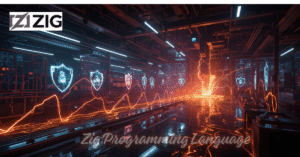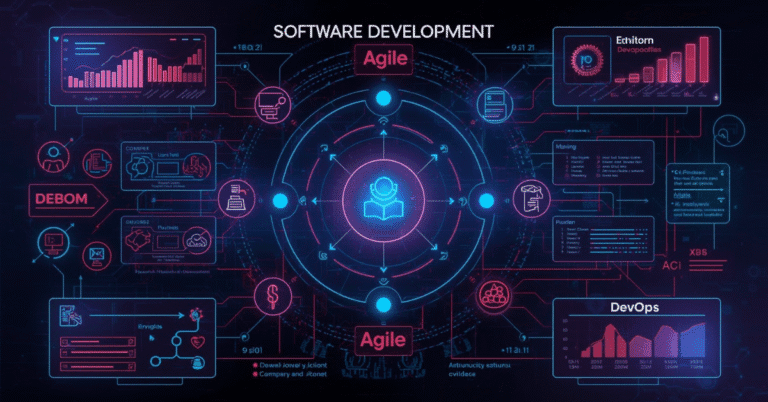
Why Zig Could Be the Next Big Language for Systems Programming in 2025
Introduction
In the fast-moving world of programming, languages rise and fall depending on performance, reliability, and developer adoption. Over the last decade, we saw JavaScript dominate web development, Python skyrocket with data science and AI, and Rust win hearts in systems programming. But there’s another language quietly growing in influence — Zig.
In 2025, Zig is no longer just a niche experimental project. Developers are starting to see it as a serious contender to C and even Rust, especially for system-level programming, performance-critical applications, and environments where control matters.
Need Fast Hosting? I Use Hostinger Business
This site runs on the Business Hosting Plan. It handles high traffic, includes NVMe storage, and makes my pages load instantly.
Get Up to 75% Off Hostinger →⚡ 30-Day Money-Back Guarantee
So, what makes Zig special? Why should developers start paying attention now? Let’s dive deep.
What Is Zig?
Zig is a low-level, statically typed programming language designed for:
- Performance: Comparable to C, often faster due to better compiler optimizations.
- Safety: No hidden control flow or memory allocations, making behavior predictable.
- Simplicity: Minimal language features, but powerful enough to replace C in many domains.
- Cross-compilation: Built-in support for targeting multiple platforms easily.
In short: Zig aims to be a modern replacement for C — without the baggage of undefined behavior and decades of patchwork fixes.
If you want more in depth details then see the pdf below
Why Developers Are Choosing Zig in 2025
1. Performance Without Garbage Collection
Unlike Go or Java, Zig does not use a garbage collector. Developers control memory management directly, but with more safety than raw C. This makes Zig ideal for games, embedded systems, and high-performance applications.
2. Cross-Compilation Made Easy
One of Zig’s biggest selling points is seamless cross-compilation. You can build executables for multiple platforms with a single toolchain. In an era where developers deploy apps across mobile, desktop, IoT, and servers, this is a huge advantage.
3. Replace Build Systems
Zig’s tooling allows developers to ditch complex build systems like CMake. You can manage dependencies, compile, and link directly using Zig’s build system. This drastically simplifies workflows for system projects.
4. Predictable & Transparent Behavior
Unlike C++, Zig avoids hidden rules or “magic.” There’s no implicit type casting, no silent memory allocation, and no exceptions. This predictability makes it easier for teams to debug, audit, and optimize applications.
5. Growing Ecosystem in 2025
In 2025, Zig’s ecosystem is still young, but it’s expanding quickly:
- Zig package manager is gaining traction.
- Developers are porting C libraries directly into Zig projects.
- Communities on GitHub and Reddit are seeing a surge of contributors.
Zig vs Rust: The Big Debate
When people first hear about Zig, they immediately compare it to Rust. While both aim to modernize low-level programming, their philosophies differ:
| Feature | Rust ✅ | Zig ✅ |
|---|---|---|
| Memory Safety | Borrow checker (strict) | Manual control (simpler, flexible) |
| Learning Curve | Steep | Moderate |
| Ecosystem | Mature | Growing fast |
| Compilation Speed | Slower | Faster |
| Cross Compilation | Okay | Excellent |
Rust focuses on absolute safety guarantees, sometimes at the cost of complexity. Zig focuses on simplicity and control, giving developers more freedom while still being safer than C.
If Rust feels too heavy or complex for a project, Zig may be the leaner alternative.
Real-World Use Cases of Zig
In 2025, Zig is finding adoption in multiple domains:
Useful Links
- Forget Selenium: Building AI Agents with browser-use & DeepSeek (The New 2026 Standard)
- Is Bun Ready to Replace Node.js in Production? A 2025 Developer’s Take
- Software Development Life Cycle (SDLC) in 2025: Stages, Models, and Modern Practices
- The Rise of Composable Software: Why Developers Need to Think Modular in 2025
- Toil is Back: Why Even with AI, SREs Feel the Burn in 2025
- Best Python Libraries for Automation Developers Overlook in 2026
- Game Engines: Indie game developers use Zig for its raw performance and portability.
- Operating Systems: Hobbyists and researchers are building OS kernels with Zig.
- Embedded Systems: IoT devices benefit from Zig’s small binary size and predictability.
- High-Performance Libraries: Zig is being used to write modules consumed by Python, Node.js, and other higher-level languages.
- WebAssembly: Zig compiles to WebAssembly efficiently, making it attractive for web performance.
Challenges Zig Still Faces
No language is perfect, and Zig has its hurdles:
- Smaller community compared to Rust and Go.
- Fewer libraries/packages available.
- Not widely taught in universities yet.
- Tooling still maturing in some areas.
However, these challenges are exactly what early adopters love — contributing to Zig feels like shaping the future of a language.
Why 2025 Could Be Zig’s Breakout Year
Several factors make 2025 the perfect storm for Zig’s adoption:
- Developers seek simplicity after complex ecosystems like Rust and C++.
- Cross-platform development demand is higher than ever.
- Security and reliability are priorities, and Zig offers safer alternatives to C.
- Tech giants exploring alternatives — many companies are now experimenting with Zig in system libraries.
If Zig continues to grow at its current pace, it may very well be the next big language of the decade.
Internal Resource
👉 If you’re exploring developer tools, check out our free SEO & development tools that can help boost your projects.
External Resources
FAQs
1. Is Zig better than Rust?
Not strictly better — it depends on your use case. Rust is safer but more complex. Zig is simpler and faster to compile.
2. Can Zig replace C?
Yes, in many cases. Zig was designed to be a modern alternative to C, especially for system programming.
3. Is Zig good for beginners?
Zig is easier than Rust but still lower-level than Python or JavaScript. Great for developers who want to learn system-level programming.
4. Does Zig support WebAssembly?
Yes, Zig compiles to WebAssembly efficiently, making it useful for web performance projects.
5. Where can I learn Zig in 2025?
Start with the official Zig docs and the growing community on Reddit and GitHub.
Conclusion
Zig is no longer an underdog experiment. In 2025, it is emerging as a serious challenger to C and Rust, offering simplicity, performance, and powerful cross-compilation. While it still has hurdles to overcome, early adopters believe Zig represents the future of systems programming.
If you’re a developer looking to stay ahead of the curve, now is the perfect time to learn Zig.

🚀 Let's Build Something Amazing Together
Hi, I'm Abdul Rehman Khan, founder of Dev Tech Insights & Dark Tech Insights. I specialize in turning ideas into fast, scalable, and modern web solutions. From startups to enterprises, I've helped teams launch products that grow.
- ⚡ Frontend Development (HTML, CSS, JavaScript)
- 📱 MVP Development (from idea to launch)
- 📱 Mobile & Web Apps (React, Next.js, Node.js)
- 📊 Streamlit Dashboards & AI Tools
- 🔍 SEO & Web Performance Optimization
- 🛠️ Custom WordPress & Plugin Development







